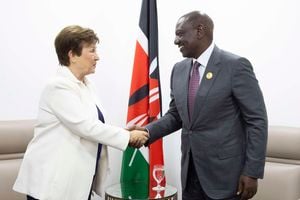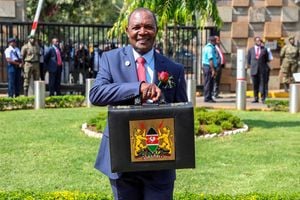
Police officers arrest a protester on Moi Avenue in Nairobi during anti-Finance Bill demos on June 27, 2024.
The International Monetary Fund (IMF) had predicted that there would be protests against controversial tax proposals contained in the Finance Bill, 2024, which it backed, but asked the State to stand firm regarding the new revenue-raising measures even as it assessed the risk as “medium”.
The multi-lateral lender’s assessment of the risk turned out to be off the mark as street protests, led largely by the youth, turned deadly, forcing President William Ruto to return the bill to Parliament with a recommendation to drop all clauses on Wednesday.
The IMF, in its latest report on Kenya, had foreseen unrest arising largely from the political opposition but asked the government to “remain committed” to reforms under its programme.
“Unrest could re-emerge in connection with protests against higher cost of living, need to raise more taxes, and electoral process supported by the political opposition. Any deterioration in the security situation could disrupt trade and tourism,” the IMF indicated in the January report.
The lender had a similar premonition last year when the government lined up a new set of taxes after the High Court blocked the Finance Act of 2023.
Value-added tax
The Kenya Kwanza administration lined up new measures including a motor vehicle circulation tax, excise, and value-added tax (VAT) measures in a contingency plan to fund the then Sh3.68 trillion budget in the absence of new revenue-raising measures.
The Plan B incidentally formed part of the originally submitted Finance Bill, 2024 where the government for instance proposed the introduction of a new motor vehicle circulation tax set at 2.5 percent of car valuations.
The National Treasury also proposed the clean-up of VAT-exempt and zero-rated lists, which would have seen critical items such as bread attracting value-added tax at 16 percent.
President William Ruto’s administration has nevertheless been forced to pull the plug on the proposals after deadly street protests this week, agreeing to public calls to reject the Bill.
The withdrawal of the bill has put the government at loggerheads with the IMF.
On Thursday, the lender indicated that it was monitoring the fallout and that it remained committed to supporting Kenya.
“The IMF is closely monitoring the situation in Kenya. Our main goal in supporting Kenya is to help it overcome the difficult economic challenges it faces and improve its economic prospects and the well-being of its people,” IMF Director for Communications Julie Kozack noted in a statement.
Destruction of property
The official said the IMF was “deeply concerned” about recent events witnessed in Kenya leading to deaths, injuries, and destruction of property.
“Our thoughts are with all the people affected by the turmoil in the country. We are committed to working together with Kenya to chart a course towards robust, sustainable, and inclusive growth,” Ms Kozack said.
The IMF is set to undertake the seventh review of its multi-year programme with Kenya, which is partly anchored on new tax measures.
The programme, which runs until April next year, is expected to accompany disbursements totalling to Sh464.9 billion ($3.6 billion). The programmed disbursement has been cut back by 7.2 percent following the settlement of Kenya’s debut sovereign bond, resulting in the dilution of investor jitters.






